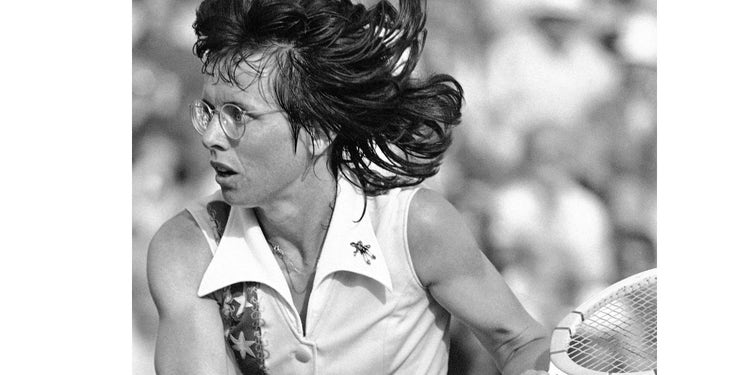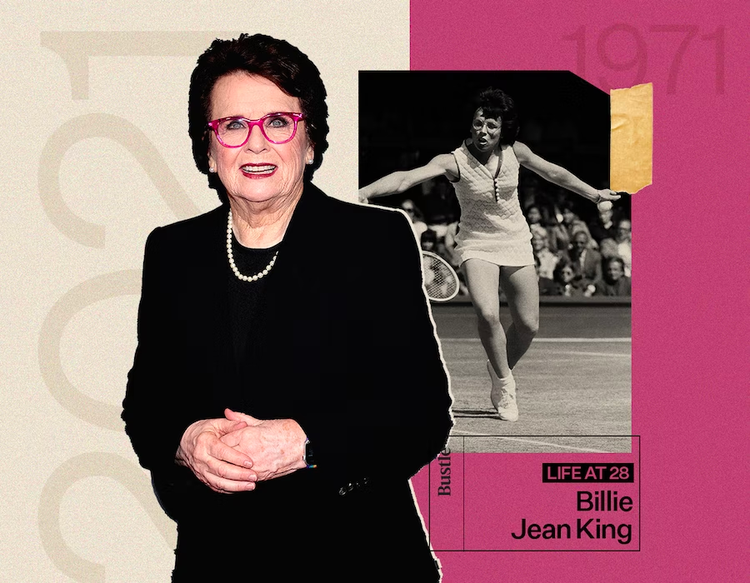For Billie Jean King, the battle never ends

Image Credit: Kathy Willens/AP/Press Association Images via NPR
She’s been called an icon and an activist. A former world number one tennis player with 39 major titles, and a major role in leading the United States tennis team to seven Federation Cup victories. But above all, Billie Jean King is a fighter, and one who has smashed as many social barriers as she has opposing serves.
In this article
- Validating women’s sports
- When inclusion begins
- The power of vulnerability
- Three keys to King’s success
Perhaps King’s most iconic fight came on September 20th, 1973, when she took on former male number one Bobby Riggs in front of 90 million viewers, in the now infamous “Battle of the Sexes.” Not only did the then twenty-nine-year-old King handily beat fifty-five-year-old Riggs in three straight sets, but she also challenged long-held notions about the gender pay gap in professional sports and inspired women around the world to stop accepting the status quo.
Validating women’s sports
“It wasn’t a tennis match. It was a fight to make people see women in sport differently,” said
King, speaking at this year’s Adobe for All Week — where our company celebrates diverse representation and creating an inclusive workplace, and where we were honored to have Billie Jean King speak to all our employees.
King went on to explain how the timing of the Battle ultimately convinced her to play the match. America had just passed Title IX, prohibiting discrimination based on gender in federally funded schools, and King felt it was essential to show the world just how much women could thrive when given the same opportunities as men.
“It wasn’t a tennis match. It was a fight to make people see women in sport differently.”
Billie Jean King
“I like pressure. I always have. I see it as a privilege,” King added, and has drawn on her appetite for high stakes battles to fight injustice since childhood — as a woman, as an athlete, and as an advocate for equality.
King recalled sitting at The Los Angeles Tennis Club as a 12-year-old, “noticing everyone was white, wearing white shoes and white clothes, and thinking that’s not right,” she recalled. “I promised myself I would fight against that forever.” And as a truly global sport, tennis gave King a platform to spread a message of diversity, equity, and inclusion around the world.

When inclusion begins
For King, inclusion starts when we experience its painful opposite: exclusion. “Nobody understands exclusion unless they’ve been excluded,” she said. “It’s such a terrible feeling that you never want to put that on anybody else. You want every human being to matter.”
King reflected on her own struggles with her sexuality over the years, including the public reaction to her being outed as LGBTQ+ in 1981. Not only did King experience internal turmoil at the time, the world around her also started to implode when seemingly overnight, sponsors cut their backing of her. Moments like those made the pain of exclusion all too real, even for an elite athlete adored by millions.
"If you weren’t born an activist, life will damn sure make you one."
Billie Jean King
Those challenging moments also made King understand the importance of being true to oneself. Marginalized people have long felt pressure to erase their authentic selves, be it their culture, their sexuality, or their beliefs, but with that comes a dampening of their potential. “If you’re not your authentic self, you don’t perform as well,” King reflected.
But moments of pain leave more than scars. They also bring us perspective, argues King. Especially when looking at the progress we've made in the past 50 years. “If a public figure comes out today, they get a call from the President,” she said. “I see that and think thank you! That’s progress!”
That’s not to say that conditions are perfect, or even move at a pace that we’d like them to. “It’s amazing how fast life moves and how slow progress is in comparison,” she admits. “But things are moving faster than ever with technology. Look how quickly you can mobilize a protest today. In the 60’s Martin Luther King Jr. had to organize his marches by calling people on the phone.”
Even more encouraging for King is the fact that increasing amounts of people are fighting and advocating on each other’s behalf, from anti-police demonstrations to the Black Lives Matter movement. “In the 60s people protested for themselves. Today, we protest for each other,” she said.
The power of vulnerability
King’s advice for people who want to better understand other people’s point of view? Start with a blank slate. “Remember that everybody has a story to tell, and if you get bored speaking with them, it probably means you haven’t asked the right questions for them to feel comfortable and reveal who they truly are,” she says.
Opening up to others is the key to becoming more open ourselves. “I was always so scared and worried about consequences,” King said. “It’s exhausting when you can’t be your authentic self. Talk to your friends. Express what you need. I’m also huge on psychotherapy and counselling, which helped me a lot. You need to get centered.”

Image Credit: New York Magazine
Three keys to King’s success
King’s parting gift for the Adobe for All Week crowd were her three keys to success, developed with her mentor, former DuPont CEO Ed Woolard.
- Relationships are everything.
Not just the connections we build in our careers and social life, but also our relationship with ourselves, which shapes how we navigate the outside world.
- Keep learning and, just as importantly, keep learning how to learn.
As King pointed out, the technology sector moves at lightspeed, especially the world of customer and consumer experiences. Even our own ability to adapt quickly and help our customers do the same lies at the heart of everything we do, a point which King elegantly drove home for attendees.
- Be a problem solver and innovator.
“As an athlete, you’re constantly problem-solving. Taking in information, processing, and going back out better prepared for the next challenge,” she said. The same goes for anyone who wants to excel and enjoy what they do. “If you’re an innovator for yourself and your company, you’ll be happier,” she concluded.
“Nobody understands inclusion unless they’ve been excluded. It’s such a terrible feeling that you never want to put that on anybody else. You want every human being to matter.”
Bille Jean King
Adobe for All Week is a time where employees share our stories with each other, celebrate our progress, and, together, commit to making meaningful change in the workplace.
Billie Jean King was perhaps the perfect speaker for our summit. As a world-class tennis player, and one of the first players to popularize the game globally, she was also an exemplary role model. A truly unique and amazing person, Billie Jean King embodies the best our world can be, where everyone can embrace their experiences and be proud of their unique and authentic selves.
#AdobeforAll